Disconnect between the rulers and the ruled
The government has no or little appetite to digest objective criticism

Prime Minister Imran Khan. PHOTO: FILE
In the last two months, I got a chance to interact with some of the country’s leading economists. We couldn’t find, despite our best efforts, any known economist who would defend the government’s economic policies. Over the last few weeks, we invited on our TV show The Review some of the big names like Dr Hafeez Pasha, Dr Syed Akbar Zaidi, Dr Kaiser Bangali, Dr Zubair Khan and Dr Ashfaq Ahmed. All of them were of the view that with current economic policies, the country is going nowhere. Dr Pasha was of the view that with the interest rate as high as 13.25%, the wheel of the economy cannot run. Dr Zubair, who was once considered close to Imran Khan, is also upset and has no hopes of the government coming good on its promises. He shares Dr Pasha’s views that the high interest rate is killing the economy and having a devastating impact on every segment of society. Dr Ishfaq, who was bitterly averse to going to the IMF, says that the stabilisation process and the devaluation of the rupee have cost Pakistan dear. Dr Sayed Akbar Zaidi, who was recently appointed as Executive Director, Institute of Business Administration (IBA), says while the government may have successfully addressed the current account deficit problem, the question is: at what cost? He insists that the cost of this economic stabilisation is too huge to have any positive impact on our economy. Zaidi minced no words in saying that the promises of 10 million jobs and 5 million houses are now just a pipedream. Dr Kaiser Bangali has portrayed even more negative a picture. He claims that Pakistan’s economy is still on a ventilator. If the current policies continue, Dr Bangali says, there is hardly any room for improvement. Instead, he fears the situation will only get worse.
Even though from independent economists, these views are understood not to go down well with the government and its supporters. The government has no or little appetite to digest objective criticism. Such are the priorities of this government that there is even the talk of social media restrictions. This shows that PM Imran Khan, like his predecessors, is allergic to criticism. One of the reasons why Dr Zubair parted ways with the PM was because the latter thought the renowned economist always painted the doomsday scenario. If the government really wants to restore some hope among the masses, it must encourage objective criticism. But that seems to be a tall order for the government which is fast losing its credibility.
Published in The Express Tribune, January 20th, 2020.
Like Opinion & Editorial on Facebook, follow @ETOpEd on Twitter to receive all updates on all our daily pieces.















COMMENTS
Comments are moderated and generally will be posted if they are on-topic and not abusive.
For more information, please see our Comments FAQ